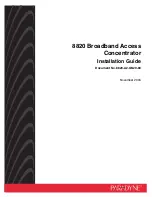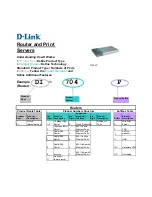
Chapter 45: IP Interface Commands
IPv6 Interface
– 1360 –
discards
The number of input IPv6 datagrams for which no problems were
encountered to prevent their continued processing, but which
were discarded (e.g., for lack of buffer space). Note that this
counter does not include any datagrams discarded while awaiting
re-assembly.
delivers
The total number of datagrams successfully delivered to IPv6
user-protocols (including ICMP). This counter is incremented at
the interface to which these datagrams were addressed which
might not be necessarily the input interface for some of the
datagrams.
reassembly request
datagrams
The number of IPv6 fragments received which needed to be
reassembled at this interface. Note that this counter is
incremented at the interface to which these fragments were
addressed which might not be necessarily the input interface for
some of the fragments.
reassembly succeeded
The number of IPv6 datagrams successfully reassembled. Note
that this counter is incremented at the interface to which these
datagrams were addressed which might not be necessarily the
input interface for some of the fragments.
reassembly failed
The number of failures detected by the IPv6 re-assembly
algorithm (for whatever reason: timed out, errors, etc.). Note that
this is not necessarily a count of discarded IPv6 fragments since
some algorithms (notably the algorithm in RFC 815) can lose
track of the number of fragments by combining them as they are
received. This counter is incremented at the interface to which
these fragments were addressed which might not be necessarily
the input interface for some of the fragments.
IPv6 sent
forwards datagrams
The number of output datagrams which this entity received and
forwarded to their final destinations. In entities which do not act
as IPv6 routers, this counter will include only those packets which
were Source-Routed via this entity, and the Source-Route
processing was successful. Note that for a successfully forwarded
datagram the counter of the outgoing interface is incremented.
requests
The total number of IPv6 datagrams which local IPv6 user-
protocols (including ICMP) supplied to IPv6 in requests for
transmission. Note that this counter does not include any
datagrams counted in ipv6IfStatsOutForwDatagrams.
discards
The number of output IPv6 datagrams for which no problem was
encountered to prevent their transmission to their destination, but
which were discarded (e.g., for lack of buffer space). Note that
this counter would include datagrams counted in
ipv6IfStatsOutForwDatagrams if any such packets met this
(discretionary) discard criterion.
no routes
The number of input datagrams discarded because no route could
be found to transmit them to their destination.
generated fragments
The number of output datagram fragments that have been
generated as a result of fragmentation at this output interface.
fragment succeeded
The number of IPv6 datagrams that have been successfully
fragmented at this output interface.
fragment failed
The number of IPv6 datagrams that have been discarded because
they needed to be fragmented at this output interface but could
not be.
ICMPv6 Statistics
ICMPv6 received
input
The total number of ICMP messages received by the interface
which includes all those counted by ipv6IfIcmpInErrors. Note that
this interface is the interface to which the ICMP messages were
addressed which may not be necessarily the input interface for the
messages.
Table 45-7: show ipv6 traffic
- display description (Continued)
Field
Description
Summary of Contents for SSE-G2252
Page 42: ...44 General IP Routing on page 627...
Page 603: ...Chapter 16 IP Configuration Setting the Switch s IP Address IP Version 6 609...
Page 883: ...Chapter 24 General Security Measures Port based Traffic Segmentation 894...
Page 989: ...Chapter 30 Congestion Control Commands Automatic Traffic Control Commands 1000 Console...
Page 1007: ...Chapter 33 Address Table Commands 1019...
Page 1137: ...Chapter 38 Quality of Service Commands 1150...
















































